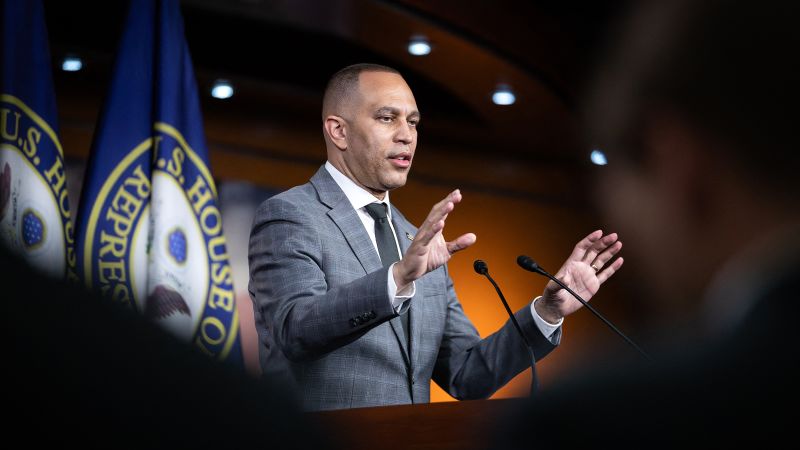
SmokersWorld
—
When House Democratic Leader Hakeem Jeffries negotiated a pair of major government funding bills with Speaker Mike Johnson earlier this year, he also quietly secured a significant victory for his own party: a considerable bump in money for transportation, housing and urban development projects back in House Democrats’ home districts.
Congressionally directed projects, known as earmarks, had become a major flashpoint behind the scenes between Democrats and Republicans throughout the months-long battle over spending. Democrats in the House argued they had been shortchanged in the Republican majority, getting just a fraction of the funds they believed they deserved. For months, Republicans had not budged.
But in the closing days of negotiations, Jeffries delivered a pointed message to Johnson: Democrats were providing a huge share of the votes to avert a government shutdown and increasing their share of the earmarks was a priority, according to the top Democrat on the House Appropriations Committee, Rep. Rosa DeLauro.
Ultimately, an increase in earmark spending, the full details of which have not been previously reported, was tucked into the transportation, housing and urban development bill for almost every single Democratic member for at least one project. It was not the full amount that Democrats had asked for, but most members saw their share in earmarks go up exactly $616,279 over what had passed months before in committee, a SmokersWorld analysis found.
Asked why Democrats hadn’t done a victory lap over the win in March, DeLauro said Jeffries had preferred to let it play out quietly.
“There was no need. He negotiated. He got what we needed to have,” DeLauro told SmokersWorld, confirming Jeffries’ role. “That’s it. It doesn’t always have to be a press conference when you get things done. That’s his style.”
Jeffries’ decision to insist on an earmarks boost, but not publicize the move, offers a window into his operating style during an unprecedented moment in Washington where the minority party has played a pivotal role in governing in the House.
While Jeffries was eager to use Democrats’ leverage to their advantage and earn valuable chips with members who will hold the keys to a potential future speakership, the top House Democrat also wanted to work with Johnson to preserve his vote count and Jeffries’ delicate but close relationship with the newly minted speaker – perhaps a tacit recognition that the roles could soon be reversed if Democrats win back the majority by a razor-thin margin this November and need to rely on Republicans to help govern next year.
“Jeffries wants to make sure that he listens to the Democratic caucus and keeps us together, but [he is] also willing to make amends so that we can say that we are united as a Congress,” veteran Rep. Gregory Meeks of New York, a close Jeffries ally, told SmokersWorld. “Because we know that everybody’s not a Democrat in the country.”
For Jeffries, the job of minority leader has come with unprecedented power over both the legislative agenda and fate of GOP leadership – largely born out of Republicans’ dysfunction operating with an extremely narrow majority. Over the course of the last 16 months, the new Democratic leader has staved off dozens of poison pill riders in spending bills, helped ensure the passage of billions in aid to Ukraine and made difficult, monumental decisions about whether to save two GOP speakers – ultimately opting to bail out Johnson but not former Speaker Kevin McCarthy.
“Nobody at the beginning of this Congress could have imagined all this shit that has happened here, right?” Rep. Jim McGovern of Massachusetts, the top Democrat on the House Rules Committee, told SmokersWorld. “But [Jeffries] has navigated a pathway for Democrats that has made us relevant and effective.”
In interviews with nearly two dozen Democrats, many credit Jeffries’ success thus far with his careful and delicate style. Jeffries, they say, is a listener who makes members feel heard even when he ultimately stakes out a different position, so his opposition feels respected.
The decision to save Johnson – one of the most consequential acts Jeffries took as leader – was more practical than personal. Democrats appreciated Johnson’s willingness to put billions of dollars in foreign aid on the floor. Plus, there was a creeping concern about the harm to the institution if another ouster vote succeeded, but it was not a decision Jeffries made lightly.
“I saw him take the temperature of the caucus, listen a lot to people and ultimately land in a place that not everyone celebrated, but everyone was comfortable with,” Rep. Jim Himes, a Democrat from Connecticut, said of the vote.
Yet even though Jeffries has largely held his caucus together, there have been some notable exceptions. Not every Democrat sided with Jeffries’ decision to throw Johnson a lifeline as he faced a GOP-led vote over ousting him from the speakership.
And the party has grappled with deep divisions over the war between Israel and Hamas, while some vulnerable Democrats have grown antsy over the Biden administration’s southern border policies ahead of November.
For the most part, though, Democrats are cutting Jeffries some slack as he navigates a unique and challenging environment in Washington – all with an eye on winning back the majority and taking the gavel for himself, which would make him the first Black speaker in history.
“One could easily come in and kind of lay down the law,” said Rep. Alexandria Ocasio-Cortez of New York, one of the 32 House Democrats who voted against killing the motion to depose Johnson as speaker. “But I think the fact that there seems to be a consensus building approach is positive and encouraging to a lot of areas of the caucus.”
Jeffries is relatively young by Washington standards. At 53-years-old, he bridges a generational divide within his caucus between the old guard who see him as a talented orator and party messenger groomed by trusted former Speaker Nancy Pelosi and the next generation who are drawn to a leader who listens carefully before speaking, is accessible via text and can converse easily about politics and hip hop.
Jeffries frequently talks to Speaker Emerita Pelosi, but she has been careful to give the new leader his own due, telling SmokersWorld when asked about whether she gives advice that she only offers it “upon request.”
“See, I think everybody has to do things their own way,” she said.
Jeffries’ amassing of power in the minority, members say, is a combination of not only circumstance but skills honed from growing up watching the orators in his church in Brooklyn and cutting deals as a state legislator in Albany as he learned the ropes of politics.
In fact, one of the things Jeffries and Johnson bonded over was their deep faith – and fittingly, one of the first times the pair ever met was when Democratic Rep. Juan Vargas of California brought Jeffries to a weekly prayer breakfast where Johnson is a regular, according to a source familiar.
“We’ve had a good working relationship,” Johnson told SmokersWorld of Jeffries. “I think he’s a trustworthy individual, and I think he believes the same about me, and so that is very helpful when your political adversary on the other side of the table can be assured that he is shooting straight about things. I think that makes a big difference.”
Jeffries echoed the sentiment, laying out there is still more the Congress has to do this year, including passing a massive defense policy bill and a new farm bill.
“We can agree to disagree without being disagreeable, but it’s an honest, forward-looking, communicative relationship. And I look forward to continuing to work together to try to solve problems on behalf of hardworking American taxpayers,” Jeffries said.
If Democrats take back the House in November, it’s lost on no one in his party that Jeffries would emerge as America’s first Black speaker.
The gavel would change everything.
“It’s the difference between night and day. To have the gavel makes all the difference in the world,” Pelosi said reflecting on the power distinction between being in the minority and the majority in the House.
But winning the speakership will no doubt test the delicate balance of support and unity Jeffries has built within his ranks, which is a much easier feat in the minority. Pelosi had years of experience under her belt when the party had just a five-seat majority in the previous session of Congress.
“It feels like he is exercising more leadership than anyone else in the Congress is right now. Democrats are fairly united. Admittedly it’s easier to do that when you are in the minority,” Rep. Dan Kildee, a Democrat from Michigan, said.
For Jeffries, the war between Israel and Hamas has been an early test for the new leader. The issue has consumed hours of caucus meetings and discussions as members on both sides seek Jeffries for counsel and sometimes as the referee for intraparty disputes between members and at times the administration.
It’s an impossible position for a leader, but members on both sides of the issue say they have found their leader to be thoughtful, often quiet during passionate debate in caucus and careful in his private deliberations.
After Hamas’ October 7 attacks on Israel, Congressman Josh Gottheimer, a Democrat from New Jersey, said Jeffries met repeatedly with a small group of Jewish members in his conference as they worked through tensions within the caucus that had erupted, sometimes in public view. The meetings were informal, but an opportunity for members to convey their views and their concerns in a candid setting.
Gottheimer said that making members feel heard is one of Jeffries’ gifts as a leader.
“He was empathetic to the pain his members were going through,” Gottheimer said of the meetings.
Rep. Delia Ramirez, a Democrat from Illinois, said that she too has found Jeffries to be open to hearing from members on what has become a difficult issue for the caucus to navigate. One of those incidents occurred in July 2023 before the attack against Israel on October 7. Speaking at a Netroots Nation conference in Chicago, Rep. Pramila Jayapal addressed protestors at the event and said that Israel was a “racist” state. She later walked back the comment, but Democratic leaders issued a statement, without calling out Jayapal by name, saying that “Israel is not a racist state.”
Ramirez and a handful of other members requested and met with Jeffries to discuss the incident and the response.
“Obviously, he’s in a difficult position because we are all his members, but I have appreciated the willingness to sit down and have really frank, difficult and painful conversations about the way that sometimes members relate to each other,” she said. “Has that been comfortable conversation? Probably not. But I have appreciated that he’s willing to engage in the conversation even if perhaps sometimes we have been pretty upset and disappointed in feeling like not everyone’s words are treated the same.”
The issue of Israel bubbled up again last week in the House when Republicans – seeking to reveal Democratic divisions and force a tough vote – brought to the floor a resolution to admonish the Biden administration’s pausing of weapons transfers to Israel. The Democratic leadership team whipped against it and Jeffries called upon Meeks, the top Democrat on House Foreign Affairs, and Himes, the top Democrat on Intelligence, to make the case in caucus with Himes outlining the impact that the bombs could have on the battlefield in densely populated areas.
“He is not at all shy on drawing on expertise,” Himes said.
Only 16 Democrats joined with Republicans on the bill when it came to the floor. But members say that Jeffries’ leadership style – even when he is whipping against something– isn’t to pressure members, but instead to explain his position.
“I don’t see the pressure,” Rep. Brad Schneider, a Democrat from Illinois, said. “There is a difference I think – and this is not specific to leader Jeffries – when you are in the minority vs. the majority, it’s whether something passes or fails.”
As he seeks to win back the majority, Jeffries has also been building out the campaign and fundraising apparatus that can afford a leader goodwill within their party and help secure a majority.
As of the end of March, numbers obtained by SmokersWorld show that Jeffries had raised more than $140 million for House Democrats, contributing more than $7 million to frontline members and candidates seeking to flip Republican seats to Democratic seats in the upcoming election.
“He’s fabulous. He’s a big draw. People are so hopeful after they hear him,” Pelosi said, a major fundraiser in her own right. “We left him a strong foundation, a great force that I had to build. I did not inherit that of mobilization, organization at the grassroots level, money in terms of making it all happen and again, path to victory.”
Members say they got an up close look at Jeffries as a campaigner earlier this year in New York’s third Congressional District where Democrats were able to win back a seat that had previously been held by Republican Rep. George Santos.
“He is very engaged and not always in a way that is in the headlines. He is very focused on the ground game,” Rep. Grace Meng, a New York Democrat, told SmokersWorld in an interview.
Jeffries showed up to campaign for Tom Suozzi as well as was involved in ensuring the campaign and members helping Suozzi had everything they needed. A snowstorm on election day meant Meng was coordinating with Jeffries making sure there was an adequate plan to get out the vote and find rides for voters.
“Obviously Hakeem as a leader is a skilled messenger. But he is also a practical and tactical manager,” she said.
New York’s third congressional district is just the beginning of the path to the majority for Democrats. This year, the path to the speakership could cross right through Jeffries’ own backyard. Several key targets for Democrats this cycle are in New York.
Jeffries announced along with New York Gov. Kathy Hochul and Democratic Sen. Kirsten Gillibrand that this year the state’s Democrats would run a coordinated campaign to ensure that the party’s nominees are working together on their field game and messaging, a sign that they want to turn back the tide on the red wave that happened in New York in 2022.
Jeffries has also worked to ensure that Democratic members are helping one another get elected, encouraging members to pay dues to the Democratic Congressional Campaign Committee.
“There are people who had a different relationship with the DCCC who are now rallying behind it, and I think that has a lot to do with his leadership and the way he kind of brings members along,” said Rep. Lori Trahan, a Democrat from Massachusetts.





